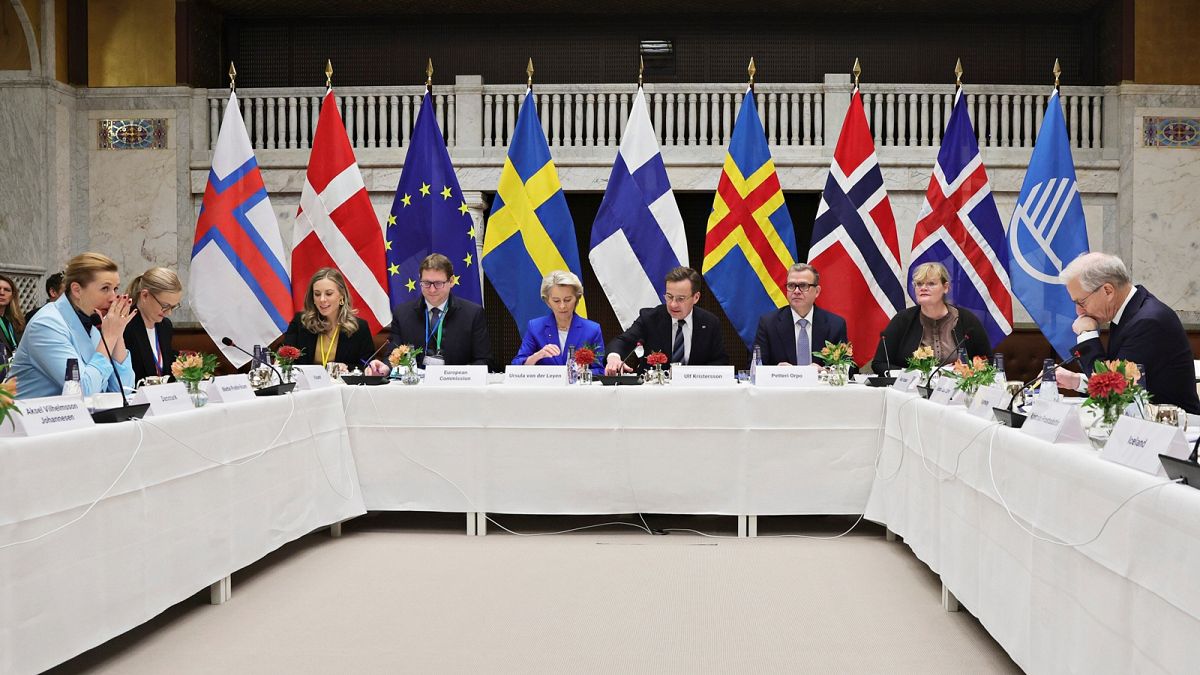Nordic leaders have ruled out the idea of issuing common debt at the European Union level to provide a €140 billion reparations loan to Ukraine, insisting the money should come from immobilised Russian assets rather than national budgets.
“I think, to be honest, it’s the only way forward and I really like the idea that Russia pays for the damages they have they have done and committed in Ukraine,” Danish Prime Minister Mette Frederiksen said on Tuesday.
The project, known as a “reparations loan”, was blocked last week by Belgium, which holds the bulk of the frozen assets from the Russian Central Bank.
The country raised multiple concerns related to the legal basis, the risks of arbitration and confiscation, and the need to ensure the participation of other G7 allies.
The deadlock considerably watered down the language of the summit’s conclusions, which contain an instruction for the European Commission to explore “as soon as possible” options to finance Ukraine’s military and financial needs for 2026 and 2027.
A potential option is the issuance of joint debt at the EU level to establish a programme of macro-financial assistance (MFA), something the bloc has already done in the past, albeit on a smaller scale, to support Kyiv.
Joint debt would not touch the Russian assets, eliminating the risks that Belgium has pointed out, but would add to the financial burden of member states, some of which are struggling to rein in their public spending and assuage worried investors.
“For me, there is no alternative to the reparations loan,” Frederiksen said, speaking at a meeting of the Nordic Council in Sweden.
“Of course, we need to find a solution to some of the technical questions that have been asked,” she added, “But first of all, this is a political choice.”
Standing by her side, Finnish Prime Minister Petteri Orpo stressed that “the only reasonable solution is to use Russian frozen assets”.
Meanwhile, Swedish Prime Minister Ulf Kristersson said the summit’s conclusions represented a “major” and “necessary” step to realise the reparations loan.
The three Nordic leaders expressed their hope that an agreement would be struck in December, when the 27 leaders are due to meet again.
Assessing options
Ursula von der Leyen, who was invited to take part in the Nordic meeting, dodged the prospect of joint debt altogether and defended her groundbreaking plan.
“The proposal is to take these cash balances (from the Russian assets) to give a loan to Ukraine that Ukraine has to pay back if Russia pays reparations. And therefore, it’s legally a sound proposal, not trivial, but a sound proposal,” the Commission president said.
Von der Leyen said the options would answer “technical questions” related to the reparations loan. A spokesperson later clarified that the exact scope of the options “remains to be seen” and noted the main focus was still on Russian assets.
Tuesday’s remarks reflect the low appetite among capitals to issue fresh debt and stand in stark contrast with the position of Belgian Prime Minister Bart De Wever, who has emerged as the most formidable obstacle in the discussions.
Last week, De Wever argued that Ukraine’s Western allies were wealthy enough to bear the brunt and cover the expenses on their own, without using the Russian assets.
“If Europe wants to create money, it can create money. This is called debt. But, of course, this is also a very sensitive topic,” De Wever said at the end of the summit.
“The big advantage of debt is that you know it. You know how much it is, you know how long you will bear it, you know exactly who’s responsible for it,” he went on.
“The disadvantage of the Russian money is that you have no idea how far the litigation will go, how long it will take, and what you will encounter in problems.”
Member states, and Belgium in particular, are waiting for the Commission to present its options paper, which might lay out alternatives, such as loans and grants for Ukraine backed by the EU budget, national contributions or a mix of both.
A possible strategy to win over De Wever is to bring in the sovereign assets located in other jurisdictions besides Belgium, such as France and Luxembourg, which hold smaller shares. However, some of these funds are kept in private banks, a likely obstacle.
The timeframe for a deal is increasingly narrow: Ukraine has warned it would need a fresh injection of assistance in the second quarter of 2026.
Read the full article here


